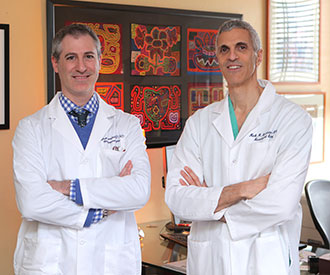
While the overall survival rate for children with cancer has improved over the last 50 years, enormous challenges still exist for those with brain tumors. Pediatric neuro-oncologists and neurosurgeons understand that a different tack is needed to make progress against these cancers. At NewYork-Presbyterian Hospital/Phyllis and David Komansky Center for Children’s Health, the pediatric brain tumor team has embarked on an ambitious effort to collect brain tumor tissue for molecular analysis — not only from NewYork-Presbyterian Hospital/Weill Cornell Medical Center, but from other regional centers, too. Their goal: to identify new therapeutic targets and customize treatment for each patient.
Through Weill Cornell Medical College’s NeuroBank, researchers are collecting pediatric and adult brain tumor tissue (extra tissue not needed for diagnosis and acquired with the consent of the patient or his/her parents), coupling it with clinical data and storing it for use by researchers from participating institutions who may apply for tissue needed for brain tumor studies.
“Because pediatric tumors are rare, it is especially important to bank as many tissue samples as possible,” notes David Pisapia, MD, Assistant Professor of Pathology and Laboratory Medicine at Weill Cornell Medical College and a neuropathologist at NewYork-Presbyterian/Weill Cornell who is overseeing the pathology side of the NeuroBank initiative. “Our goal is to make the Weill Cornell NeuroBank a central brain tumor tissue bank for the region.”
“The ability to understand brain tumor biology starts with having tissue you can analyze,” adds Mark Souweidane, MD, Chief of Pediatric Neurological Surgery at NYP/Komansky Center and Professor of Neurological Surgery at Weill Cornell. “Conventional treatments target cells growing at an increased rate, but they do not address the cell type and biology. Only by studying the molecular and genomic signals driving brain tumor growth will we be able to make progress.” He and Jeffrey Greenfield, MD, Associate Professor of Neurological Surgery, are co-directing the effort, with a team of other brain tumor experts at Weill Cornell.
The NeuroBank brings together a number of separate initiatives launched over the past couple of years into one cooperative effort. Individual laboratory interest, participation in the Children’s Oncology Group (COG), and the recent launch of the Institute for Precision Medicine at Weill Cornell Medical College and the New York Genome Center are now converging into a centralized process that will facilitate important scientific quests.
The mission of the Institute for Precision Medicine is to replace the traditional “one-size-fits-all” medicine paradigm with one that focuses on targeted, individualized patient care using a patient’s own genetic profile and medical history. The identification of molecular signaling pathways driving cancer growth and progression can be used to design innovative therapies targeting these molecules, which may differ from one patient to the next.
In its first full year of participation in the COG protocol, Weill Cornell ranked eighth out of 142 global member institutions. This year, Weill Cornell remains poised for the highest accrual of patients on study to date. Within the institution, strong collaborative efforts between the Department of Neurological Surgery and the Division of Surgical Pathology have served as a platform for the success of such national protocols and the development of the now institution-wide NeuroBank. Researchers from participating institutions may apply to use the tissue in studies determined by a governance committee to be of scientific merit. “The world has recognized that pediatric brain tumors are genetically unique and can’t all just be considered ‘children’s brain tumors,’” concludes Dr. Souweidane. “There’s a great show of force, unity, and thought driving the NeuroBank effort. The promise of this initiative is huge.”
Physicians interested in contributing tissue to the Weill Cornell Medical College NeuroBank may contact the Department of Pathology and Laboratory Medicine at (212) 746-2700.
This article was originally published in the NewYork-Presbyterian “Focus on…” newsletter, January 2015.